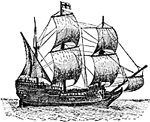 Historic or Historical? This blog could have been named the Historic Notionist. However, that would be presumptuous.
Historic or Historical? This blog could have been named the Historic Notionist. However, that would be presumptuous.
The two words historic and historical are often interchanged but do not mean the same thing. In fact, the words’ proper usages are grammatically distinct. Yet, a quick consult to the a well known and portable reference source seems to only further the confusion.
Confusion is somewhat forgivable as the words actually originated as synonyms—with historic being the truncated form of historical, as early as the 18th century. While still commonly misused, the different meanings are now so well established such that interchanging the two words is grammatical error.

Defining the Terms
Webster’s Dictionary defines historic as: 1. same as HISTORICAL; 2. famous in history [1].
In comparison, Webster’s defines historical as: 1. of or concerned with history; 2. based on people or events of the past; 3. established by history; factual [2].
The dictionary seems to imply that the words could be interchanged.
Using the Terms
Historic is not the same as historical, despite what a dictionary definition could suggest. What is historical is not necessarily historic.
Independence Hall in Philadelphia is an historic building, and the signing of the Declaration of Independence was an historic event. Inside Independence Hall there are many historical 17th and 18th century items such as chairs, tables, and books, but nothing is more historic than George Washington’s Rising Sun Armchair [3].
To call this site Historic is far too assuming. We will stick with Historical. HN
Footnotes
- Webster’s New World Dictionary, Warner Books Paperback Edition, p. 287 (1987).
- Id.
- The Rising Sun Armchair (George Washington’s Chair) (1995-2013). Retrieved 2014 from http://www.ushistory.org/more/sun.htm.